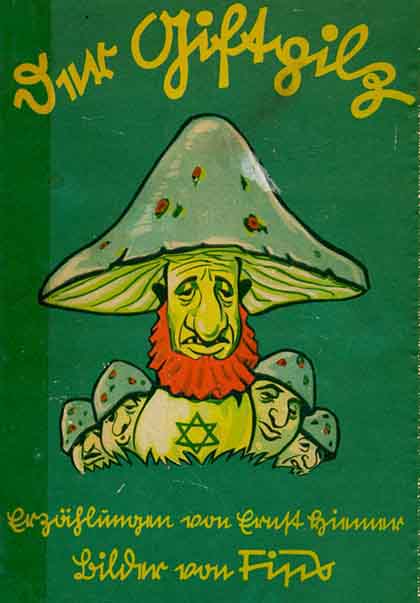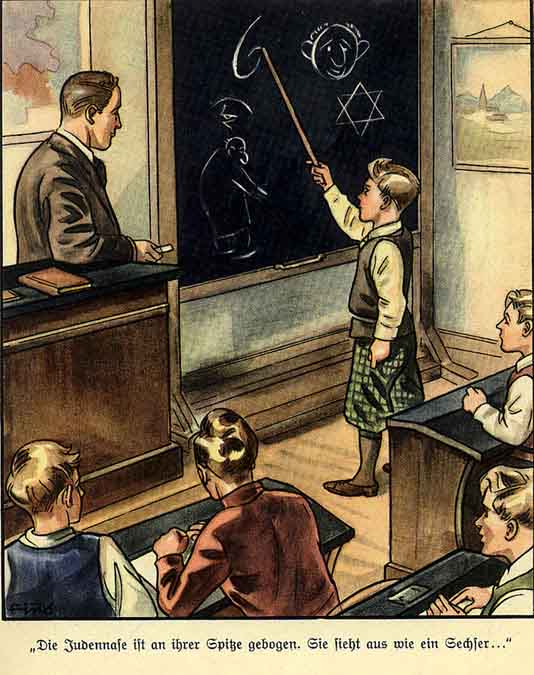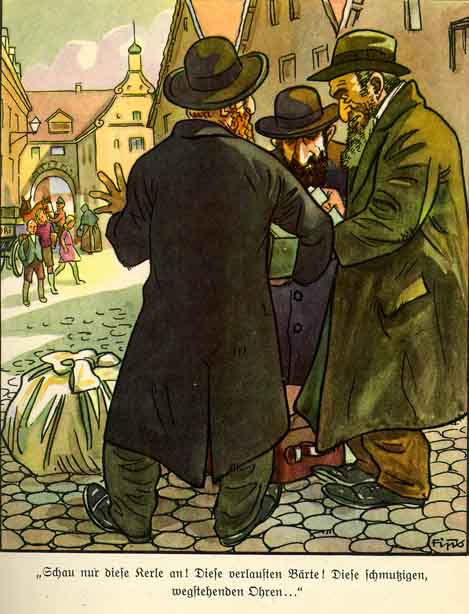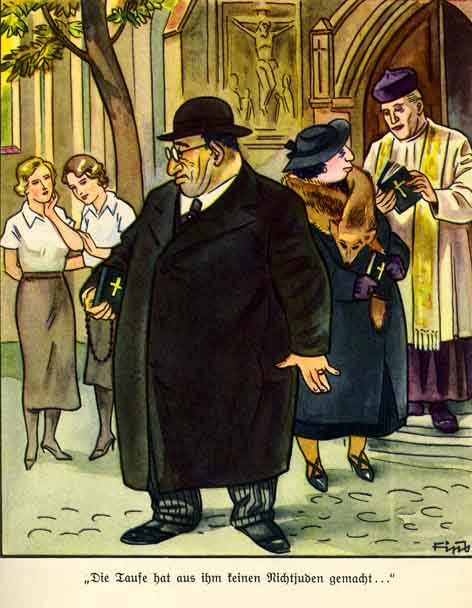“Look, Franz, human beings in this world are like the mushrooms in the forest. There are good mushrooms and there are good people. There are poisonous, bad mushrooms and there are bad people. And we have to be on our guard against bad people just as we have to be on guard against poisonous mushrooms. Do you understand that?”
Philipp Rupprecht (4 September 1900 – 4 April 1975), aka Fips, drew antisemitic cartoons for Julius Streicher’s Der Stürmer, the Nazi newspaper. Rupprecht churned out hundreds of cartoons and graphic propaganda for the organ from 1925 to 1945. In 1938, Rupprecht’s illustrations appeared in Der Giftpilz (The Poisonous Mushroom), an antisemitic book for German children, copies of which made their way into the classroom. Words are by Ernst Hiemer (5 July 1900 – 29 July 1974).
In the book, young Franz is gathering mushrooms. His mother explains that although mushrooms look alike, some will harm you. The poisonous mushrooms are the Jews.
Having told the kids that Jews look just like everyone else, Rupprecht then contradicts Franz’s mother by guffing out portraits of Jews as easily identifiable sub-humans, the very Devil in human form. Franz tells his mother not to worry. He’s been learning how to spot a Jew in school. Jews are big-nosed, big-eared, rubber-lipped ignorant wasters and clever over-achievers who molest children, abuse animals, swindle the poor and are so bad that before ‘dying for our sins’ (and thus being able to rise again) Jesus (born a Jew) told Germans never to forget that the only good Jew is a dead Jew. Franz has also been learning how Jews are terrible racists. Franz knows that racism is wrong so when he grows up he will do his bit to exterminate the Jews.
The image of the Jewish monster perpetrating misfortune is presented at the end of each episode in the form of a short poem, which capsulizes the specific immoral act allegedly committed by a Jew, connects all Jews to the Devil, and serves to warn the reader against the ever-present Jewish threat.
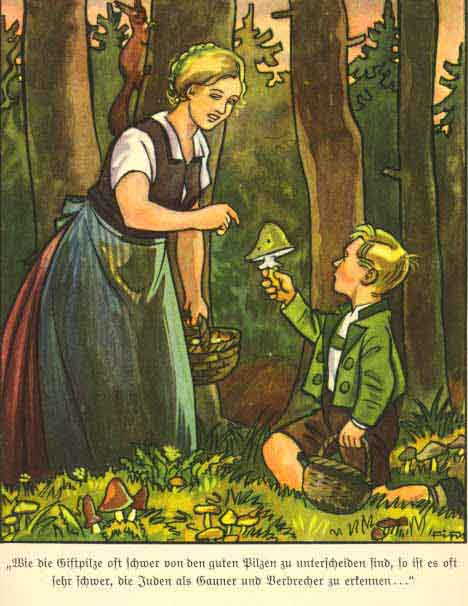
“Just as it is often hard to tell a toadstool from an edible mushroom, so too it is often very hard to recognize the Jew as a swindler and criminal…”
The Poisonous Mushroom
“Look, Franz, human beings in this world are like the mushrooms in the forest. There are good mushrooms and there are good people. There are poisonous, bad mushrooms and there are bad people. And we have to be on our guard against bad people just as we have to be on guard against poisonous mushrooms. Do you understand that?”
“Yes, mother,” Franz replies. “I understand that in dealing with bad people trouble may arise, just as when one eats a poisonous mushroom. One may even die!”
“And do you know, too, who these bad men are, these poisonous mushrooms of mankind?” the mother continued.
Franz slaps his chest in pride:
“Of course I know, mother! They are the Jews! Our teacher has often told us about them.”
The mother praises her boy for his intelligence, and goes on to explain the different kinds of “poisonous” Jews: the Jewish pedlar, the Jewish cattle-dealer, the Kosher butcher, the Jewish doctor, the baptised Jew, and so on.
“However they disguise themselves, or however friendly they try to be, affirming a thousand times their good intentions to us, one must not believe them. Jews they are and Jews they remain. For our Volk they are poison.”
“Like the poisonous mushroom!” says Franz.
“Yes, my child! Just as a single poisonous mushrooms can kill a whole family, so a solitary Jew can destroy a whole village, a whole city, even an entire Volk.”
“Tell me, mother, do all non-Jews know that the Jew is as dangerous as a poisonous mushroom?”
Mother shakes her head.
“Unfortunately not, my child. There are millions of non-Jews who do not yet know the Jews. So we have to enlighten people and warn them against the Jews. Our young people, too, must be warned. Our boys and girls must learn to know the Jew. They must learn that the Jew is the most dangerous poison-mushroom in existence. Just as poisonous mushrooms spring up everywhere, so the Jew is found in every country in the world. Just as poisonous mushrooms often lead to the most dreadful calamity, so the Jew is the cause of misery and distress, illness and death.”
The author then concludes this story by pointing the moral:
German youth must learn to recognise the Jewish poison-mushroom. They must learn what a danger the Jew is for the German Volk and for the whole world. They must learn that the Jewish problem involves the destiny of us all.
“The following tales tell the truth about the Jewish poison-mushroom. They show the many shapes the Jew assumes. They show the depravity and baseness of the Jewish race. They show the Jew for what he really is:
The Devil in human form.
Franz has understood.
How To Tell A Jew
Things are lively in Mr. Birkmann’s 7th grade boys’ class today. The teacher is talking about the Jews. Mr. Birkmann has drawn pictures of Jews on the blackboard. The boys are fascinated. Even the laziest of them, “Emil the Snorer,” is paying attention, not sleeping, as he so often does during other subjects. Mr. Birkmann is a good teacher. All the children like him. They are happiest when he talks about the Jews. Mr. Birkmann can do that well. He learned about the Jews from life. He knows how to put it in gripping terms such that the favorite hour of the day is the “Jewish hour.” Mr. Birkmann looks at the clock.
It is almost noon,” he said, “now we want to summarize what we have learned in this lesson. What did we discuss?”
All children raise their hands. The teacher calls on Karl Scholz, a little boy on the first bench. “We talked about how to recognize a Jew.”
“Good! Now tell us about it!”
Little Karl takes the pointer, goes to the black board and points to the sketches.
“One usually recognizes a Jew by his nose. The Jewish nose is crooked at the end. It looks like the figure 6. Therefore it is called the “Jewish Six”. Many non-Jews have crooked noses, too. But their noses are bent, not at the end but further up. Such a nose is called a hook nose or eagle’s beak. It has nothing to do with a Jewish nose.”
“Right!” says the teacher. “But the Jew is recognized not only by his nose …” The boy continues. The Jew is also recognized by his lips. His lips are usually thick. Often the lower lip hangs down. That is called “sloppy”. And the Jew is also recognized by his eyes. His eyelids are usually thicker and more fleshy than ours. The look of the Jew is lurking and sharp.
The teacher calls on another lad. He is Fritz Müller, and is the best in the class. He goes to the board and says:
“Jews are usually small to mid-sized. They have short legs. Their arms are often very short too. Many Jews are bow-legged and flat-footed. They often have a low, slanting forehead, a receding forehead. Many criminals have such a receding forehead. The Jews are criminals too. Their hair is usually dark and often curly like a Negro’s. Their ears are very large, and they look like the handles of a coffee cup.”
The teacher turns to the students.
“Pay attention, children. Why does Fritz always say ‘many Jews have bow legs’, or ‘they often have receding foreheads,’ or ‘their hair is usually dark’?”
Heinrich Schmidt, a large, strong boy in the last row speaks.
“Every Jew does not have these characteristics. Some do not have a proper Jewish nose, but real Jewish ears. Some do not have flat feet, but real Jewish eyes. Some Jews cannot be recognized at first glance. There are even some Jews with blond hair. If we want to be sure to recognize Jews, we must look carefully. But when one looks carefully, one can always tell it is a Jew.”
“Very good,” the teacher says. “And now tell me about other ways to tell Jews from non-Jews. Richard, come up here!”
Richard Krause, a smiling blond lad, goes to the board. He says: “One can recognize a Jew from his movements and behavior. The Jew moves his head back and forth. His gait is shuffling and unsteady. The Jew moves his hands when he talks. He “jabbers.” His voice is often odd. He talks through his nose. Jews often have an unpleasant sweetish odor. If you have a good nose, you can smell the Jews.”
The teacher is satisfied.
“That how it is, kids. You have paid attention! If you pay attention outside school and keep your eyes open, you won’t be fooled by the Jews.”
Then the teacher goes to the desk and turns over the black board, on its back is a verse. The children recite it in chorus:
From a Jew’s countenance — the evil devil talks to us,
The devil, who in every land — is known as evil plague.
If we shall be free of the Jew — and again will be happy and glad,
Then the youth must struggle with us — to subdue the Jew devil.
How the Jews Came to Us
The scene of the next story is a small German town. School-children stop in the street to observe and comment on three “Eastern Jews.”
“Look at those creatures!” cries Fritz.
“Those sinister Jewish noses! Those lousy beards! Those dirty, standing-out ears! Those bent legs! Those flat feet! Those stained, fatty clothes! Look how they move their hands about! How they haggle! And those are supposed to be men!”
“And what sort of men?” replies Karl. “They are criminals of the worst sort.”
He describes their trafficking in wares and how, when they have money enough they
“get rid of their dirty clothes, cut their beards off, de-louse themselves, put on up-to-date clothes and go about as if they were not Jews. In Germany they speak German and behave as though they were Germans. In France they speak French and act as Frenchmen. In Italy they want to be Italians; in Holland, Dutch; in America, Americans; and so on. So they carry on throughout the whole world.”
Fritz laughs at this and says anyhow they can always be recognized as Jews. Karl nods:
“Naturally, one can tell them if one uses one’s eyes. But unfortunately, there are still many who fall for the Jewish swindle.”
Fritz answers:
“Not me! I know the Jews! I know, too, a verse about them:
“Once they came from the East,
Dirty, lousy, without a cent;
But in a few years
They were well-to-do.
Today they dress very well;
Do not want to be Jews any more
So keep your eyes open and make a note:
Once a Jew, always a Jew!”
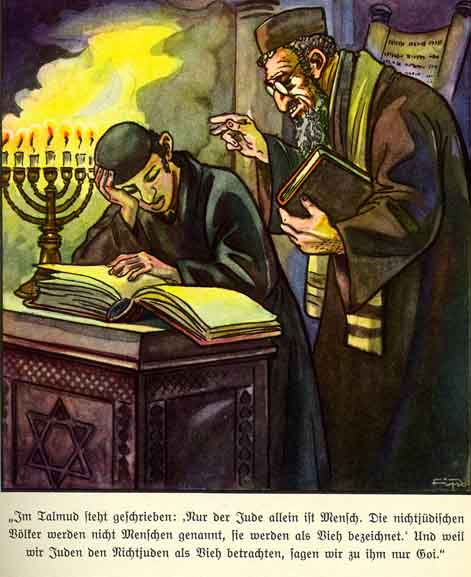
“In the Talmud it is written: ‘Only the Jew is human. Gentile peoples are not called humans, but animals.’ Since we Jews see Gentiles as animals, we call them only Goy.”
What is the Talmud?
Solly is thirteen years old. He is the son of the livestock-Jew Blumenstock from Langenbach. There is no Jewish school there. Solly therefore has to go to the German school. His schoolmates don’t like him. Solly is fresh and insolent. There are always fights. And Solly is always responsible for them.
Today Solly doesn’t have to go to school. He has to visit a rabbi in the city. A rabbi is a Jewish preacher. And this Jewish preacher wants to see if Solly has diligently studied the teachings of the Jewish religion. Solly has gone to the synagogue. A synagogue is the church of the Jews. The rabbi is waiting for him. He is an old Jew with a long beard and a genuine devil’s face. Solly bows. The rabbi leads him to a reading table where there is a large, thick book. It is the Talmud. The Talmud is the secret law book of the Jews.
The rabbi begins the examination.
“Solly, you have a non-Jewish teacher in school. And every day you hear what the Gentiles say, what they believe, and the laws by which they live …”
Solly interrupts the rabbi.
“Yes, rabbi, I hear that every day. But that doesn’t concern me. I am a Jew. I have laws to follow that are entirely different from those of the Gentiles. Our laws are written down in the Talmud.”
The rabbi nods.
“Right! And now I want to hear what you know about them. Give me a few sayings or proverbs that you have heard in the Gentile school!”
Solly thinks. Then he says:
“A proverb of the Gentiles is: ‘Work is no disgrace.'”
“What do the Gentiles mean by that?”
“They mean to say that it is no disgrace when one has to work.”
“Do we Jews believe that?”
“No, we don’t believe that! In our law book the Talmud it is written:
Work is noxious and not to be done.
Therefore we Jews don’t work, but mostly engage in commerce. Gentiles are created to work. In the Talmud it also says:
The rabbi teaches: There is no lower occupation than farming. A Jew should neither plow the field nor plant grain. Commerce is far more bearable than tilling the soil.”
The rabbi laughs.
“You’ve learned very well. But I know another Talmud passage that you must learn.”
He opens the Talmud. Solly must read:
The Gentiles are created to serve the Jews. They must plow, sow, weed, dig, reap, bundle, soft, and grind. The Jews are created to find everything ready.
The rabbi continues his examination.
“Tell me several more principles or proverbs of the Gentiles!”
Solly answers:
“The Gentiles say: “Be ever loyal and upright. Honor is the surest defense.”
“What do the Gentiles mean by that?”
“They mean that one should always be honest in life. One should not lie and cheat. That’s what the Gentiles say.”
“And what do we Jews do?”
“We may lie and cheat Gentiles. In the Talmud it says:
It is permitted for Jews to cheat Gentiles. All lies are good.
And furthermore it is written:
It is forbidden for a Jew to cheat his brother. To cheat a Gentile is permitted.
When we loan the Gentiles money, we must demand usurious interest. For in the Talmud it is written:
Concerning robbery it is taught: Gentiles may not rob each other. The Gentile may not rob the Jews. But the Jews may at any time rob the Gentiles.
It further says:
If a Jew has stolen something from a Gentile and the Gentile discovers it and demands it back, the Jew should simply deny it all. The Jewish court will stand by the Jew.
It is also permitted for us Jews to buy stolen goods from a thief, when they come from Gentiles. We Jews may also be fences without sinning before our God. Smuggling and tax evasion are also permitted for us Jews. In the Talmud it is written that we may cheat Gentile authorities of customs and taxes. It says:
Smuggling is permitted, for it is written: You need not pay what you owe.
Also thievery is permitted for Jews. But we may steal only from the Gentiles. The Talmud says:
The words ‘Thou shalt not steal’ in the text refer only to thievery from Jews. Stealing from Gentiles is not meant.”
“What does that mean?” the rabbi asked.
“That means that we cannot steal from or cheat Jews. But we can cheat Gentiles at any time. That is permitted for us.”
The rabbi is satisfied.
“Excellent! In conclusion, give me several more laws from the Talmud.”
Solly is delighted with the rabbi’s praise. Solly says: “In the Talmud it is written:
Only the Jew is human. The Gentile peoples are not called people, rather they are named animals.
And because we see Gentiles as animals, we call them goy, it is also permitted for us at any time to perjure ourselves before a Gentile court. In the Talmud it is written:
The Jew is permitted to swear falsely before a Gentile court. Such an oath is always to be seen as compelled. Even when a Jew swears by the name of God, he is allowed to tell a lie, and in his heart to reject the oath he has made.
Furthermore, in the Book of Sirach it says:
Terrify all the nations, 0 Judah! Lift up your hands against the Gentiles! Incite the wrath of the Gentiles against each other and pour out anger! Shatter the princes who are enemies to the Jews.”
“Enough!” interrupts the rabbi. He comes up to Solly and shakes his hand. Then he says:
“You are a fine Talmud student. You will become a real Jew. Always think about what the Talmud demands of you. The teachings and laws of the Talmud are more important and more to be obeyed than the laws of the Old Testament. The teachings of the Talmud are the words of the living Jewish god. He who breaks the laws of the Talmud deserves death. You should think about that throughout your whole life. If you always follow the Talmud laws diligently, you will join our biblical fathers in the Jewish heaven. Amen!”
Murder, thievery, and lies
Robbery, perjury, and cheating
These are all permitted for the Jews,
As every Jewish child knows.
In the Talmud it is written,
What Jews hate and what they love,
What Jews think and how they live,
All is ordained by the Talmud.
Why the Jews Let Themselves Be Baptized
This story tells about the baptizing of a Jewish man and his wife. The picture shows a fat, sallow-faced man and a pink-powdered woman coming out of Church, both holding large prayer-books in their hands, while the priest at the Church door is giving them a parting blessing. Two blond German girls in the background comment upon this scene. They comment on their appearance and point out that the baptism makes no difference: they are Jews just the same.
Anne says:
“Do you know our girls’ leader once told us : ‘Just as little as a Negro can be made into a German by baptism, can a Jew be made into a non-Jew.’ ”
Grete stamps her feet angrily on the ground:
“I do not understand these priests who go on baptizing Jews even today. By doing so they admit a criminal mob into the churches.”
Anne concludes:
“I believe a time will come when the Christians will curse the clergy who once allowed Jews to enter the Christian Church. For the Jews only want to destroy the Christian Church. And they will destroy it if our clergy go on allowing Jews to enter. There is a saying:
‘If a Jew comes along
Wanting a priest to baptize him,
Be on your guard and beware;
Jew remains always Jew!
Baptismal water helps not a jot.
That does not make the Jew any better!
He is a Devil in Time
And remains so through Eternity!'”
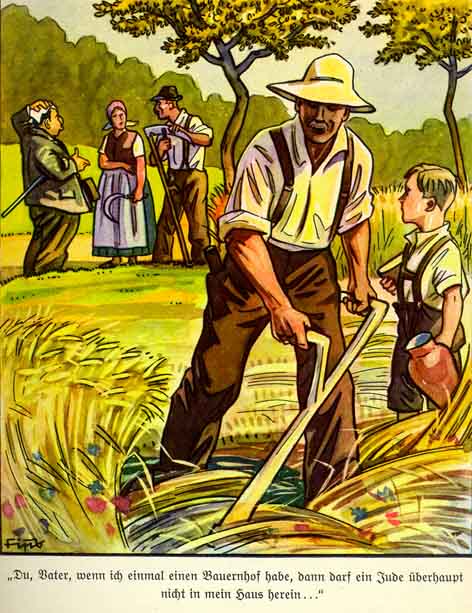
How a German Peasant was Driven from House and Farm: “Daddy, someday when I have my own farm, no Jew will enter my house…”
How a German Peasant Was Driven from House and Farm
This story tells how a German peasant was driven from his land and farm by a Jewish financier, who, enforcing usurious interests, ruins the peasant and compels him to sell his farm. The picture shows the Jew in the background enforcing his claim, while in the fore a neighboring peasant and his young son discuss what is taking place.
Little Paul is frightfully shocked. His eyes sparkle with anger. “What a mean Jew!” he says. Then he is silent awhile. Full of loathing, he looks at the Jew. He would like best to break the waterjug on the creature’s head. But what could the little fellow do! That would not help his neighbor.
“Father, when I am grown up and have a farm of my own, I will always think of our neighbor. And no Jew shall ever enter my house. I will write on the door: Jews prohibited! And if a Jew were to come in, I would at once throw him out!”
The Father nods:
“Right, Paul! One should have nothing to do with a Jew. The Jew will always cheat us. The Jew will take from us all we possess. Every peasant must make a note of that!”
“Yes,” says little Paul, “and I will always think of the saying which teacher has taught us at school:
“The peasant prays to the Lord:
Oh, keep the hail from us,
Protect us from lightning and flood,
Then we shall have again good harvest.“But worse than these plagues,
Never forget, is the Jews!
Be warned: Look out
For the bloodthirsty Jew!”
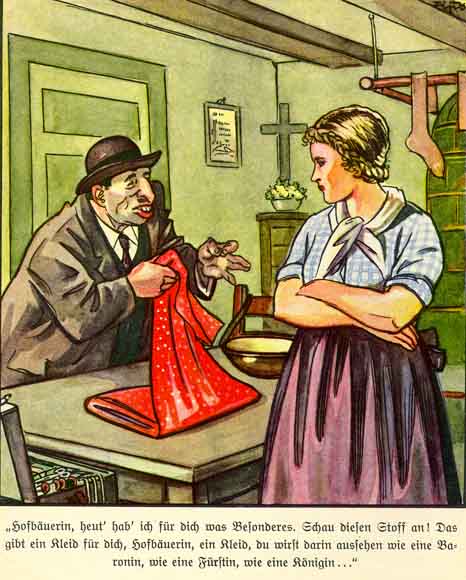
How Jewish Traders Cheat: “Farming woman, have I got something special for you today. Look at this material! You can make a dress from it that will make you look like a baroness, like a countess, like a queen…”
How Jewish Traders Cheat
This story introduces a Jewish hawker who tries to sell bad cloth to a young German peasant girl.
It is a festival evening in the village when the Jew turns up with his wares. The Jew flatters the peasant woman and spreads out his wares.
“Everything the heart desires, Levy has for sale.”
But the German peasant girl turns down his offers.
The Jew persists, and shows her some stuff of
“… purest wool. That will make a dress for you, woman, so that you will look like a Baroness or a Princess, like a Queen. And cheap, too, that I can tell you!”
But the peasant woman knows the Jew too well.
“I am buying nothing from you,” she says, and goes away.
The Jew packs up and goes away cursing. He consoles himself with the knowledge that there are lots of other peasants who can be more easily duped than this one. The story concludes:
Woe to the woman, however, who lets herself be taken in by his chatter. It will happen to her. As has happened to so many other peasant women once they have let the Jew in. There is no escape. There is an old saying:
“The Jewish hawker
Is a cheat and seducer.
He lies all the time
And you — you pay the price.So many have gone through the mill.
Would you be saved from these penalties.
Then don’t let the Jew come in
And buy only from a German.”
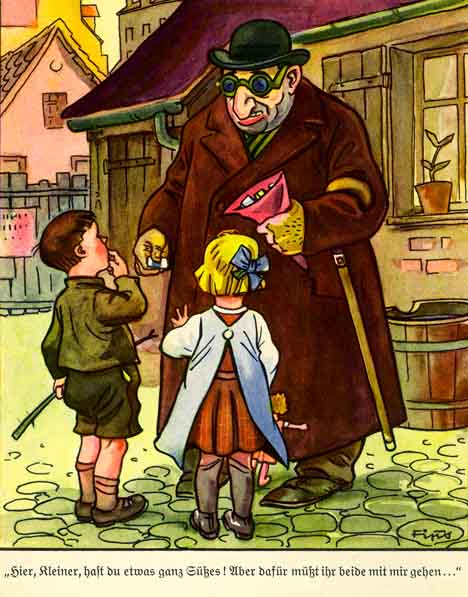
The Experience of Hans and Else with a Strange Man: “Here, kid, I have some candy for you. But you have to come with me…”
The Experience of Hans and Else with a Strange Man
In this story a Jew tries to entice little children to his home, by giving them caramels. The little boy saves his sister by calling the police.
Else begins to have plenty of sweets.
Hans asks from where they are coming.
“I have got them from a strange man. But don’t tell mother! The man strictly forbade me to do so!”
Hans is curious. They arrange to go together. The “man” wants them to go with him.
Hans hesitates — Hans thought:
“What does the man want of us? Why should we go with him?”
Suddenly a great fear comes over him.
“You are a Jew!” he cries and seizing his sister, runs off as fast as his legs will carry him. At the corner of the street he meets a policeman. Quickly Hans tells his story. The policeman gets on his motor-bike and soon overtakes the strange man. He handcuffs him and takes him to prison.
At home, subsequently, there is great rejoicing. The police praise Hans for being a brave lad. His mother gives him a large piece of chocolate while teaching him the following saying:
“A devil goes through the land,
The Jew he is, known to us all
As murderer of the peoples and polluter of the races,
The terror of children in every country!“He wants to ruin the youth.
He wants all peoples to die.
Have nothing to do with a Jew
Then you’ll be happy and gay!”
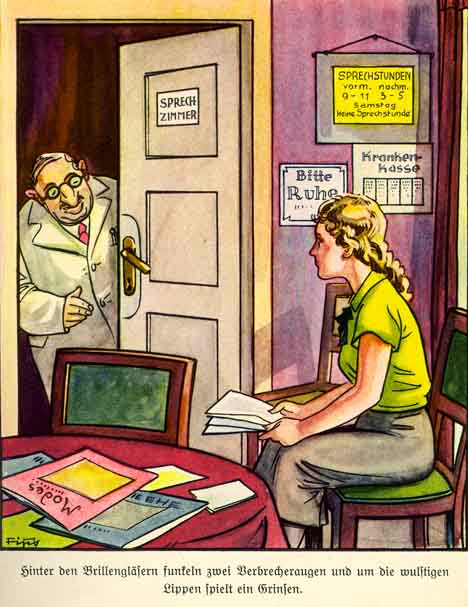
Inge’s Visit to a Jewish Doctor: “Two criminal eyes flashed behind the glasses and the fat lips grinned.”
Inge’s Visit to a Jewish Doctor
Inge is sick. For several days she has had a light fever and a headache. But Inge did not want to go to the doctor.
“Why go to the doctor for such a trifle?” she said again and again when her mother suggested it. Finally her mother insisted.
“March! Go to Dr. Bernstein and let him examine you!” her mother ordered.
“Why Dr. Bernstein? He is a Jew! And no real German girl goes to a Jew,” Inge replied.
Her mother laughed.
“Don’t talk nonsense! Jewish doctors are all right. They are always chattering nonsense about it at your BDM [League of German Girls] meetings. What do those girls know about it?”
Inge protested.
“Mother, you can say what you want, but you can’t slander the BDM. You should know that we BDM girls understand the Jewish question better than many of our parents. Our leader gives a short talk about the Jews nearly every week. Just recently she said: ‘A German may not go to a Jewish doctor! Particularly not a German girl! Because the Jews want to destroy the German people. Many girls who went to a Jewish doctor for healing found instead sickness and shame!’ That’s what our leader said, Mother. And she’s right!”
Her mother grew impatient.
“You always think you know more than the grown-ups. What you said just isn’t true. Look, Inge. I know Dr. Bernstein well. He is a fine doctor.”
“But he is a Jew! And the Jews are our deadly enemies,” Inge replied.
Now her mother became really angry.
“That’s enough, you naughty child! Go to Dr. Bernstein right now! If you don’t, I’ll teach you how to obey me!”
Her mother screamed and raised her hand.
Inge did not want to be disobedient, so she went. Went to the Jewish doctor Bernstein!
Inge sits in the reception room of the Jew doctor. She has to wait a long time. She looks through the journals which are on the table. But she is most too nervous to read even a few sentences. Again and again she remembers the talk with her mother. And again and again her mind reflects on the warnings of her leader of the BDM [League of German Girls]: “A German must not consult a Jew doctor! And particularly not a German girl! Many a girl that went to a Jew doctor to be cured, found disease and disgrace!”
When Inge had entered the waiting room, she experienced an extraordinary incident. From the doctor’s consulting room she could hear the sound of crying. She heard the voice of a young girl: “Doctor, doctor leave me alone!”
Then she heard the scornful laughing of a man. And then all of a sudden it became absolutely silent. Inge had listened breathlessly.
“What may be the meaning of all this?” she asked herself and her heart was pounding. And again she thought of the warning of her leader in the BDM.
Inge was already waiting for an hour. Again she takes the journals in an endeavor to read. Then the door opens. Inge looks up. The Jew appears. She screams. In terror she drops the paper. Frightened she jumps up. Her eyes stare into the face of the Jewish doctor. And this face is the face of the devil. In the middle of this devil’s face is a huge crooked nose. Behind the spectacles two criminal eyes. And the thick lips are grinning. A grinning that expresses: “Now I got you at last, you little German girl!”
And then the Jew approaches her. His fleshy fingers stretch out after her. But now Inge has her wits. Before the Jew can grab hold of her, she hits the fat face of the Jew doctor with her hand. Then one jump to the door. Breathlessly Inge runs down the stairs. Breathlessly she escapes the Jew house.
In tears she returns home. Her mother is shocked to see her child.
“For God’s sake, Inge! What happened?”
It is a long time before the child can say anything. Finally Inge tells about her experience with the Jew-doctor. Her mother listens in horror. And when Inge finishes her story, her mother lowers her head in shame.
“Inge, I shouldn’t have sent you to a Jewish doctor. When you left I regretted it. I couldn’t relax. I wanted to call you back. I suspected suddenly that you were right. I suspected that something would happen to you. But everything came out all right, thank God!”
Her mother moans, and tries to conceal her tears.
Gradually Inge calms down. She laughs again. “Mother, you’ve done a lot for me. Thank you. But you have to promise me something: about the BDM … ”
Her mother doesn’t let her finish.
“I know what you want to say, Inge. I promise. I’m finding that one can learn even from you children.”
Inge nods.
“You’re right, Mother. We BDM girls, we know what we want, even if we are not always understood. Mother, you taught me many sayings. Today I want to give you one to learn.” And slowly and significantly Inge says:
The Devil, it was he
Who sent the Jew-doctor to Germany.
Like a devil he defiles
The German woman, Germany’s honor.The German people, they’ll not be sound
Unless very soon the way is found
To German healing, German ways,
To German doctors in future days.
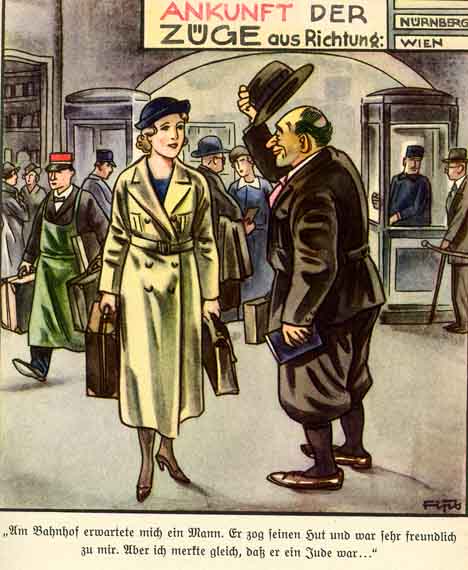
How the Jew Treats his Domestic Help: “A man was waiting for me at the station. He tipped his hat and was very friendly to me. But I could tell immediately that he was a Jew…”
How the Jew Treats His Domestic Help
This story tells of a 23 year-old Rosa, who went into domestic service, using a Jewish agency in Vienna. For four weeks the parents have heard nothing of her. They are troubled. Finally a letter comes from Rosa telling how she was handed on and her experience, and how, finally, she reached a Jewish home in England, via the Jewish Agency. In England:
“They were again Jews. I got only small wages and had to work from early morning till late at night. I had almost nothing to eat. The Jews treated me as if I were a dog. I was perpetually insulted.”
The letter goes on to tell how she was rescued by the wife of a good German business man, who was on a visit to London.
“They rescued me from slavery. They even bought me a return ticket.”
Rosa concludes:
“The Jew is a devil. I shall hate him as long as I live. And I shall always think of the saying I heard yesterday:
‘German woman, great or small,
The Jew calls you simply: Goja.
He hates you, corrupts you,
Treats you worse than cattle.‘If a girl wants to keep herself pure
Let her steer clear of the Jews!
If she wants to make good in life’s struggle,
Let her have no truck with the Jews!'”

How Two Women were Tricked by Jewish Lawyers: “Well, Colleague Morgenthau, we did a good piece of business today.” “Splendid, Colleague Silberstein. We took the lovely money from the two Goy women and can put it in our own pockets.”
How Two Women Were Tricked by Jewish Lawyers
This story tells how a Jewish lawyer, by making the same promises to two German women, complainant and defendant, takes fees from both. In the Court judgment is given: “Both women are guilty. Both must pay.”
After the Court proceedings the two Jewish lawyers who have so arranged the case congratulate one another on the good business they have done:
“Now we have muloted the two Gojas of their money, we can put it in our sack!”
The two German women recognize they have been cheated, make peace with one another, and take the experience as a warning never to quarrel again and
“Never to go again to Jewish lawyers.”
“We will remember all our lives this saying:
‘The Jewish Lawyer
Has no feeling for Justice.
He only goes to Court
Because of the prospect of money.Whether brave and good people
Wear themselves out and bleed,
Leaves the Jew completely cold.
Never go to a Jewish lawyer.'”
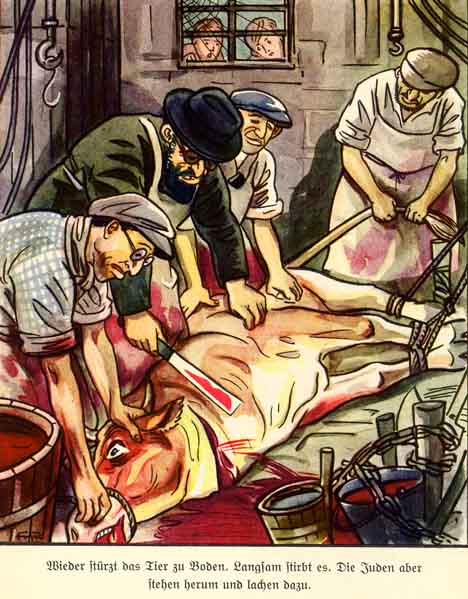
How Jews Torment Animals: “The animal fell once more to the ground. Slowly it died. The Jews stood around and laughed.”
How Jews Torment Animals
In this story the accusations of ritual murder are repeated. Two boys, Kurt and Otto, go to a Jewish slaughter house, hide themselves, where they can watch the Jews killing a cow. The process of fixing the cow and the operation is described, involving callous brutality and Schadenfreude on the part of the Jewish butchers. Four Jews hold down the cow while its neck is being cut.
“The Jews stand there and — laugh.”
At the end, Otto says:
“Kurt, now I believe you. The Jews are the meanest persons in the world.”
Kurt answers:
“Yes, the Jews are a murderous people. With the same brutality and lust for blood with which they kill animals they also kill human beings. Have you ever heard of ritual murders? On such occasions the Jews kill boys and girls, men and women. From the beginning Jews have been murderers. They are Devils in human form. There is a saying:
‘Anger, envy, hatred, rage,
Are in the blood of the Jew,
Towards every people on the earth
Who do not belong to the “Chosen.”
‘He kills animals and men,
His blood-lust knows no bounds.
The world can only recover
When it is rid of the Jew
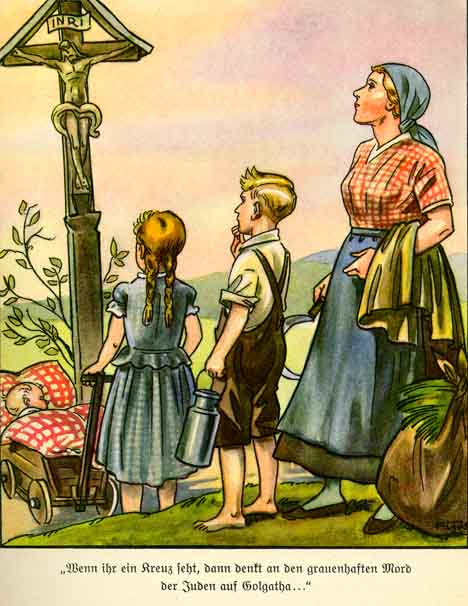
What Christ Said about the Jews: “When you see a cross, remember the gruesome murder of the Jews on Golgotha…”
What Christ Said about the Jews
A peasant mother returning from field-work, with her three children, pauses before a way-side Christ. The mother talks to them about the wickedness of the Jews.
“She points to the Cross, which stands by the road:
“‘Children, look there! The Man who hangs on the Cross was one of the greatest enemies of the Jews of all time. He knew the Jews in all their corruption and meanness. Once He drove the Jews out with a whip, because they were carrying on their money-dealings in the Church. He called the Jews: killers of men from the beginning. By that He meant that the Jews in all times have been murderers. He said further to the Jews: Your father is the Devil! Do you know, children, what that means? It means that the Jews descend from the Devil. And because they descend from the Devil they can but live like devils. So they commit one crime after another.’
“The children look thoughtfully at the Cross. Mother continues:
“‘Because this Man knew the Jews, because He proclaimed the truth to the world, he had to die. Hence the Jews murdered Him. They drove nails through His hands and feet and let Him slowly bleed. In such a horrible way the Jews took their revenge. And in a similar way they have killed many others who had the courage to tell the truth about the Jews. Always remember these things, children. When you see the Cross, think of the terrible murder by the Jews on Golgotha. Remember that the Jews are children of the Devil and human murderers. Remember the saying:
“As long as Jews have been on earth
There have been enemies of the Jews.
They gave warning of the Jewish blood
And even sacrificed their blood,
So that the world might know the Devil
And not plunge into ruin;
So that the world might soon be freed
From its slavery to the Jew.”
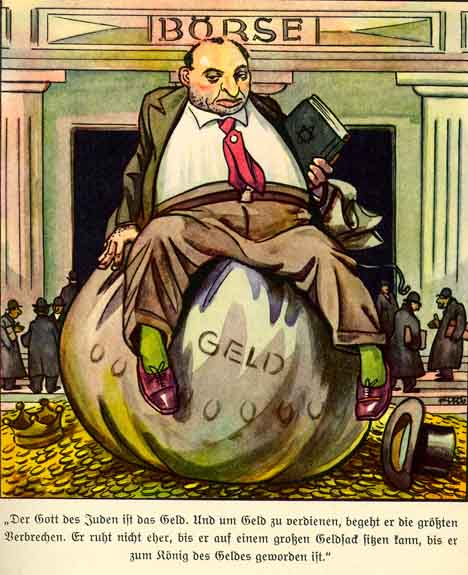
Money Is The God Of The Jews: “The God of the Jews is money. To earn money, he commits the greatest crimes. He will not rest until he can sit on a huge money sack, until he has become the king of money.”
Money is the God of the Jews
Liselotte looks out at the cottage window towards evening and talks to her mother about the hard way in which father has to work. She says:
“Do you know, mother, what I sometimes wish? I should like to be rich. Very rich! And with my money I would make people happy. I should love to help the poor!”
They go on talking. Liselotte asks:
“Tell me, mother, how does it happen that the Jews are so rich? Our teacher has told us at school that here are thousands of Jews in the world who are millionaires. And yet the Jews do not work. It is the non-Jews who must work. The Jew only trades. But one cannot become a millionaire by trading with paper, bones, old clothing and furniture!”
Mother explains how it is done.
“The Jew is quite indifferent when the cheated non-Jew goes hungry. Jews have no pity. They strive for one thing: — money. They do not care two hoots how they get it.”
Liselotte asks how they can behave in this mean way.
Mother answers:
“Child, one thing you must realize. The Jew is not a person like us. The Jew is a Devil. And a Devil has no sense of honour. A Devil deals only in meanness and crime. You have read your Bible, Liselotte. There it says the Jewish God once said to the Jews: ‘You must eat up the people of the earth!’ Do you know what that means? It means the Jew should destroy all other peoples. They should bleed and exploit them till they die. That is what it means.”
Liselotte tries to understand these things.
Mother continues:
“Yes, my child, that’s the Jew! The God of the Jews is gold. There is no crime he would not commit to get it. He has no rest till he can sit on the top of a gold-sack. He has no rest till he has become King Money. And with this money he would make us all into slaves and destroy us. With this money he seeks to dominate the whole world. All that is contained in the following saying:
‘The Jew has only one idea in this world;
It is: Money, Money, Money!
By every kind of trick and device
To make himself immeasurably rich.
What cares he for scorn and contempt!
Money was and is his God!
Through money he hopes to lord it over us,
And achieve the mastery of the world.'”
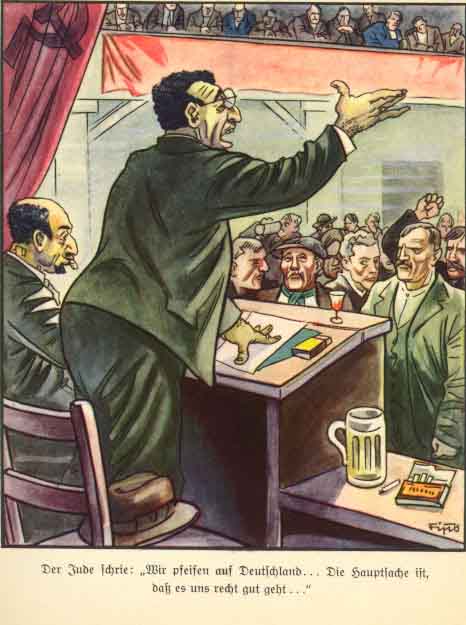
How Worker Hartmann Became a National-Socialist: The Jew cries: “We don’t care about Germany… The main thing is that things go well for us…”
How Worker Hartmann Became a National-Socialist
This story tells how a decent German worker, after listening to the talk of a Jewish speaker in a Communist meeting, turns away in disgust and joins the National-Socialists of Herr Hitler.
The Hitler-Youth is out for a tramp. On the way they meet worker Hartmann and they invite him to tell them a story. Worker Hartmann tells how, years ago, unemployed, he became a Communist. He describes the Communist meetings. One day he observes that the leaders are Jews.
“And as one of the Jews was always talking about Russia and always saying it was best there, I grew angry and interrupted: Why are you always talking about Russia? We are German workers! Yes, we’re Germans. We want to hear something about Germany, not Russia!”
He goes on to tell how the speaker grew fearfully angry and finally called out:
“What do we care about Germany? All that matters is that we get on and have a good time!”
“Now I knew enough. We workers should become traitors to the Fatherland. We should co-operate with the Jews for the ruin of Germany. I would not be a traitor to the Fatherland. No, never! I turned my back on the Jews and left the meeting. Three others came with me. That night I could not sleep. But then I knew what to do. I left the Communist Party. Later, I found my way to Adolf Hitler. And I say to you: I shall stay with Hitler as long as I live. I know the Jews. I shall always think of the song that we workers sang:
‘If a Volk wants to be powerful
It must hold firmly together.
For strikes and upsets and the Class struggle
Are the ruin of a Volk.
This the world has been taught often enough
Throughout the centuries.
Eternal peace will only come
When we have been freed from the Jews.'”
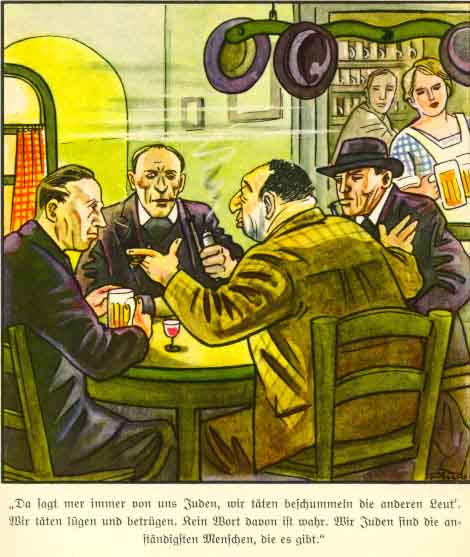
Are There Decent Jews?: “People are always saying that we Jews cheat other people, that we lie and deceive. Not a word of it is true. We Jews are the most decent people in the world.”
Are There Decent Jews?
Four Germans sit talking in a public house. One is a Jew, Salomon, who is telling the others that the Jews are the most decent people to be found anywhere.
Zimmermann won’t have it and cites cases of Jewish rogues he has met.
The Jew gets uneasy, and seeks a way out by saying:
“Oh well, but those are exceptions!”
The peasant joins in the talk and supports Zimmermann.
“Salomon gets angry. He has paid for the beer and still must listen to that sort of talk from them.
“You talk a lot of stupid nonsense!” he cries, “but not a word about decent Jews. And there are plenty of decent Jews. Am I not one? Was I not a soldier at the front? Did I not defend the Fatherland. Have I not paid for your beer, you impudent creatures, stupid Gois!”
There is silence in the room. Then the worker gets up who has said little, and throws a coin to the Jew.
“Finished, Salomon. Here is your money. We will not have you paying for us. But now you shall have the truth! You liar! You never heard a bullet. You were ‘indispensable’ and stayed at home profiteering, then you were with the Reds, calling ‘Down with Germany!’ ‘Long live the World Revolution!’ And now you are a decent Jew? Not a bit of it! There aren’t any decent Jews.
Salomon picks up his hat and runs like the Devil from the public house. Everybody laughs.
“What a pity he has gone!” says mine host. “I should like to have repeated the following saying to him:
‘So oft we hear the yarn
How brave such and such a few was.
How he gave his money to the poor
And was an angel in the world.
‘A Jew, like a pure angel?
That must be a fairy tale!
Who invents such things?
It is the Jew, himself, who does it!'”
Who can save Germany from the Jews? Why, it’s the book’s publisher and hero of heroes Julius Streicher.
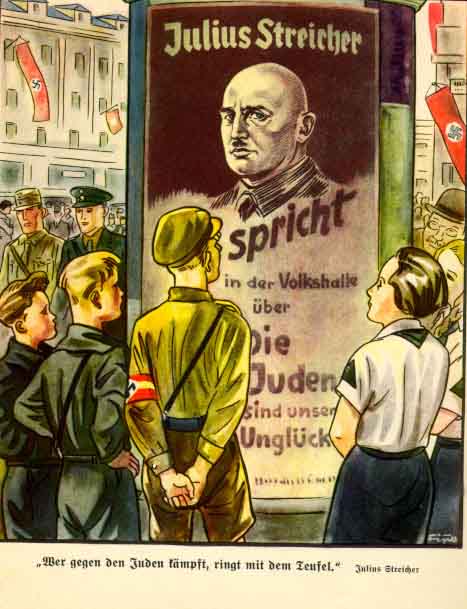
Without Solving the Jewish Question No Salvation for Mankind: “He who fights the Jews battles the Devil.” Julius Streicher.
Without Solving the Jewish Question No Salvation for Mankind
“The Pimpfs of the Hitler Boys’ Organization (Jungvolk) are proud of their black uniform. ‘We are the real Hitler-men’ say the Pimpfs. Although ‘men’ is a bit overdone, they are right in one thing: the Pimpfs are loyal to the Führer in life and death.”
The Pimpfs are talking — in this concluding story — among themselves. One of them describes a National-Socialist Party march in Munich on the previous November 9th.
“Next to the Führer was General Goering, who was formerly severely wounded at the Felderrnhalle. I saw, too, Reichministers Dr. Goebbels, Frick, Rust, and the Reichsleiter Rosenberg, Amann, Schwarz, our Reich Youth Leader Schirach, and many other old campaigners. Before the Führer was carried the Blood-Flag, which received its consecration on November 9th. 1923. And in front of the Blood-Flag marched a man who, in 1923, too, was in the front and the thick of it: Julius Streicher.”
Another Pimpf says:
“We know him all right. He is the enemy of the Jews. That is why all the Jews hate him.”
“You are right” says another. “The Jews hate and insult only those whom they most fear. And they are afraid of Streicher.”
The pimpf so far has not said anything. Suddenly he stops. Then he grasps his two friends by the arm and pulls them away. They stop in front of a bill-board. They read a large poster. It says Julius Streicher makes an address in the People’s Hall about “The Jews are our misfortune.”
“That is where we go!” shouts Konrad, “I wanted to hear him speak for a long time.” “I have heard him once before at a meeting two years ago,” says Erich. “Do tell us all about it!” the two pimpfs beg.
The Hitler youth recounts:
“The meeting was overcrowded. Many thousands of people attended. To begin with, Streicher talked of his experiences in the years of struggle, and of the tremendous achievements of the Hitler Reich. Then he began to talk about the Jewish question. All he said was so clear and simple that even we boys could follow it. Again and again he told about examples taken from life. At one time he talked most amusingly and cracked jokes, making all of us laugh. Then again he became most serious, and it was so quiet in the hall that one could hear a needle drop. He talked of the Jews and their horrible crimes. He talked of the serious danger which Judaism is for the whole world.
“Without a solution of the Jewish question there will be no salvation of mankind.”
That is what he shouted to us. All of us could understand him. And when, at the end, he shouted the “Sieg-Heil” for the Fuehrer, we all acclaimed him with tremendous enthusiasm. For two hours Streicher spoke at that occasion. To us it appeared to have been but a few minutes.“Yes, my dear friends! I shall always think of that meeting. And I shall never forget the speaking-choir which we heard at the end of the gathering:
“From the Germany Hitler created
Resounds a cry to the whole world:
Free yourselves from the Jewish hand
And save both Volk and Fatherland!“The world awakes in Juda’s chains
Germany alone it knows can save!
Through German idea and German Being
Will one day the whole world be restored.”Julius Streicher
Indoctrinating children was part of the master plan for the self-styled master race. As Mary Mills writes:
“By 1937, 97% of all teachers belonged to the National Socialist Teachers’ Union. Every member of this union had to submit an ancestry table in triplicate with official documents of proof. Courses and textbooks in Nazi schools reflected the aims of Hitler. Of the topics that teachers were required to treat, the most important was racial theory and, by extention, the Jewish problem. In The National Socialist Essence of Education, a German educator wrote that mathematics was “Aryan spiritual property; .. an expression of the nordic fighting spirit, of the nordic struggle for the supremacy of the world…” An example of racial propaganda in a math problem is the following: “The Jews are aliens in Germany–in 1933 there were 66,060,000 inhabitants in the German Reich, of whom 499,682 were Jews. What is the per cent of aliens?”…
In the introduction to Die Judenfrage im Unterricht, published in 1937 by Der Stürmer, Julius Streicher made the following statement: “The National Socialist state requires its teachers to teach German children racial theory. For the German people, racial theory means the Jewish problem.” The teacher’s manual on the Jewish problem maintains that German children have an inborn aversion to Jews that is intensified by references made to Jews in the newspapers, conversations, and songs sung by members of the SA and HJ. Intermarriage between Germans and Jews is portrayed as unnatural because it does not follow the Nazi perversion of the natural biological order, which does not allow for intermixing. Storks mate with storks; swallows mate with swallows, etc. The Nuremberg Laws are depicted as a return to the natural order that God intended, and the Jew is thus shown as a threat to God’s order.
From this point, the projection of the Jew as an enemy of the German people is a quick and easy step. He is conveyed as an infiltrator, who, upon gaining entry into German society, has usurped the political and economic power of Germany and focused his attention upon the destruction of the German people. Because the Jew is deemed such a threat to German society, the Nuremberg Laws are viewed as a justifiable means of self-defense. In order to make the status of the Jew as a deadly enemy of everything German as concrete as possible to German children, the teacher’s guide suggests that pictures of Jews (which, of course, are ugly or distorted) be posted on the board next to pictures of the ideal German type. From the visual differences, other differences are inferred. “The Jews walk differently than we do. They have flat feet. They have longer arms than we do. They speak differently than we do.”
After the war was over, Rupprecht was sentenced to 10 years hard labor. He was released on 23 October 1950 from the prison in Eichstätt and for the rest of his life worked as a house painter in Munich and Starnberg. Evil always was banal.
Via Nizkor, Calvin, The Holocaust Historiography Project
Would you like to support Flashbak?
Please consider making a donation to our site. We don't want to rely on ads to bring you the best of visual culture. You can also support us by signing up to our Mailing List. And you can also follow us on Facebook, Instagram and Twitter. For great art and culture delivered to your door, visit our shop.
